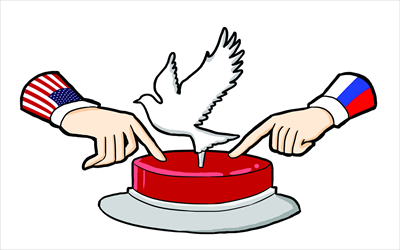US, Russia need to see their ties grow

In the interest of world peace and development, not to mention the US national interest, US-Russia relations must improve. Divisive international issues and domestic US politics, however, could increase tensions between Washington and Moscow.
Recently, former secretary of state Colin Powell expressed concern that presidential candidate Mitt Romney called Russia the "number one geopolitical foe" of the US. General Powell indicated that this was a reckless statement and an indication of the extremist point of view of Romney's many neoconservative campaign advisors.
Should Romney defeat Obama in November, would the new president's policy toward Russia lead to deteriorating relations and increased international tensions?
One would hope not, but this would be a possibility unless Romney changes advisors after the election. He would have to place more moderate political appointees in key positions at the Department of State and the Department of Defense.
Unfortunately, the Republican Party has come under the domination of its extreme right wing. Moderates and progressives hold little sway in the party these days.
US senator Richard Lugar, a well known moderate Republican and the ranking member of the influential Senate Foreign Relations Committee, just lost his Indiana primary election and will not return to the Senate in this election cycle.
The extreme right wing of his own party opposed him in the primary election facilitating his defeat. His party and all Americans have lost an experienced and able leader.
The heated political rhetoric of Republicans such as Romney reflects the present state of the Republican ideology and organization. It is not merely campaign rhetoric.
President Obama is accused by his Republican opponents of being ineffective at both domestic and foreign policy. They seek a more confrontational policy toward Russia.
The Obama administration initially announced an intention to "reset" relations, but years have passed without significant improvement.
Some believe that if the president would improve relations with Russia now prior to the fall elections, many Americans could feel reassured as to his foreign policy acumen.
There are contradictions: The Obama administration itself has created obstacles to improvement with its policies on NATO mission expansion, ballistic missile defense, Syria, and Iran.
Sending an activist academic devoid of diplomatic experience as ambassador to such a sensitive post as Moscow was another serious error in White House judgment and showed a lapse in Russia policy.
US-Russian relations have remained quite good over the centuries. Relations during the Soviet era were, of course, difficult but commercial relations continued and we were allies in World War II. Cold War competition was limited and ways were found to manage state-to-state relations.
Looking back, commercial relations began even during the US colonial period. Peter the Great, tsar of Russia, issued a proclamation in 1697 permitting the import of Virginia tobacco to Russia which became a major trade item for a time.
Significant trade then developed over the next century and a half, with the US importing key Russian products such as hemp, flax, and iron. These items were critical naval stores allowing US ships, including our navy, to have essential high quality military grade rope, sails, and iron fittings.
After World War I, during the early Soviet era, a number of well known US firms invested in projects in the Soviet Union as a result of Vladimir Lenin's practical "new economic policy" development strategy.
At the diplomatic level, Russia was a consistent friend of the US during the tsarist era. Catherine the Great was a friend during the independence struggle and early republic. Later, when Britain and France supported the southern secession, Russia under Alexander II was a firm supporter of the Soviet and then US president Abraham Lincoln.
In the present era, there is much room for positive development of commercial and diplomatic relations. Major joint projects involving the development of Siberia and a tunnel under the Bering Strait could be undertaken given today's technology. Serious and substantial cooperation on international issues of mutual concern must be undertaken.
Obstacles to US-Russia relations must be overcome and show marked improvement whatever the outcome of the US elections in November.
The author is a professor at the Virginia Military Institute. opinion@globaltimes.com.cn